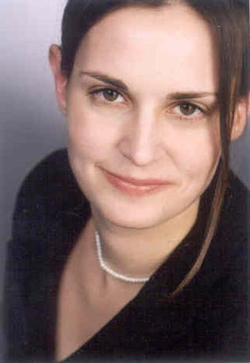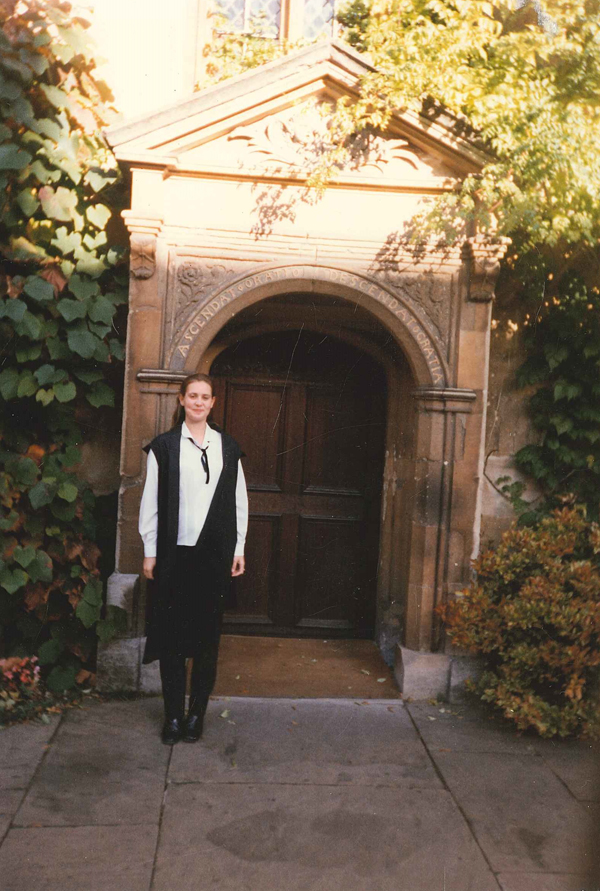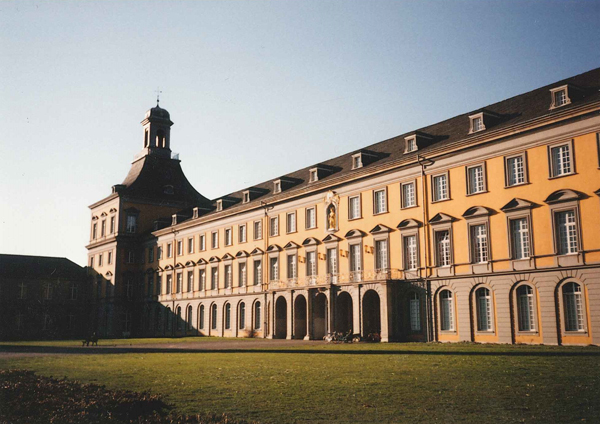Students Then and Now; or, from Education to Professionalization
By Julia Kuehn

When I was an undergraduate in the nineties, bizarre students included, at least for my friends and me:
- those who knitted or crocheted in lectures/seminars;
- young mothers breastfeeding at the back of lecture halls; and
- students who had heard of ‘theory’ and ‘talked the talk’. Deconstruction and postcolonial theory were just starting to take hold in German universities.
And then there was that particularly weird species of the suit-wearing male. In fact, I think I’ve only ever seen about two dozen members of that species in my four years at Bonn University. Mind you, I was in English and German Literature, so they were less frequently seen in the Arts Faculty than in the Law and Business Faculties down the road. Of all the bizarre students, the suited male was probably the weirdest for us. You might think us terribly judgmental, and I guess we were. Having said this, on average, suit-wearers in English or German Literature lost their uniform after about a week. A month at the most. Back then, I worked as an undergraduate Research Assistant with one such suit—named Marc-Sven Kopka—who was a mature student with previous training in PR and advertising. A lovely guy, smart as can be. He lost the suit very quickly and became like the rest of us; realized why he actually went to university after three years of training in PR and advertising, and a few years of work experience. (For those who don’t know: Germany still has this most wonderful system of apprenticeships where school leavers commit to three years of learning on the job, as plumbers, carpenters, electricians, travel agents or public relations people, while attending (more academic) evening classes at least twice a week.)
Where am I going with this? Well. I have a problem with suits on campus, as I think they are indicative of where our university system has gone in the past decade or so. Students have become far more professionalized and profession-oriented. We see those suits when the various societies come to our classes, hold their society’s inaugurations or run bazaars. I see them in my function as Associate Dean where I attend lots of inaugurations, prize ceremonies and meetings with student reps. And then we see various students throughout the year who are obviously interviewing for internships or jobs before or after your lecture. Our undergraduates then turn from students into young adults that want an internships/job/an entry for their CVs—who are entering the professional life and have to dress for the part. Compared to Arts, I think there are still more suits in Business, Economics and Law (and some medical students wear them underneath their white coats too). But on the whole, and also due to the new campus, which allows for more student mixing and also means longer walks for everybody (to the library, etc.), it just feels as if there were many more suit-wearing students than in my time as a student.

This is me as a student at Oxford University in 1996
I know these steps towards professionalization are a reality—our undergraduates need jobs at the end of their degree, and it is a tough and competitive world out there. They need to pay off student loans and support their families who have supported them so far. It feels as if we, in the nineties, did not have these worries. We knew there would be a job for us somewhere. And yet, I do not like this professionalization of our students which is, sadly, a result of the corporatization of our universities. HKU, like almost all universities around the world, is now run like a business, with checks and balances, investment on return, top-slicing and downsizing. It offers degrees (in return for money), and aims to prepare young people for the job market and a career. We teachers—who experience university’s managerial practices on a daily basis, writing vision statements, five-year plans and teaching outcomes – know how much ‘education’ is losing as a result. We have no longer the ‘homo scholasticus’ in front of us in the classroom but we have young people sitting there who want value for money, specific grades and, certainly, at least an Upper Second at the end of their 3, now 4, years at university. They are a product of this age. Neo-liberal capitalism sees the individual as a speck of human capital, with a potential to increase his own and his society’s capital. Michel Foucault saw the problem in the 70s when he lamented that neo-liberal capitalism had replaced ‘homo politicus’ with the ‘homo economicus’. No longer citizens with an interest in politics, democracy, human rights and human development but cash-oriented capitalists, whose sole allegiance is to the god Mammon.
Because of the way our universities are run in this day and age, students have, out of necessity, become more professionalized. The degrees have become professionalized. Our graduate exit surveys ask whether the degree has prepared students for a job, and whether they are now leaders. And I am sad, remembering why my friends and I went to university:
- We were not interested in an apprenticeship, or did not get one;
- University in Germany was free. Our fees were 1,500 HKD per semester, which included free public transport in a 50km radius and gave us 18-year olds time to figure out what we wanted to do later on;
- We went for the love of learning. School hadn’t been enough. We had only specialized in the last 2 years. We wanted more English Literature, more History, more Music, more Linguistics, or whatever.
Today’s students need to be professional. University is expensive. The job market is tough. There is no time for wrong decisions (about a major/minor, course, or entire degree programme). No time to waste; no time to do anything that does not guarantee an entry on a CV.
So our students are focused. They know what they want (or what their parents want them to want) and they know (thanks to our ever so detailed, more-often-than-not prescriptive curricula) what they need to do to get to where they want to be or need to be. There is no time to mess around, intellectually or otherwise. There is no time for an education; there is only time for training and a degree certificate.
What a shame. One of my pet hates is the ever-recurring student question: ‘If I write this, is this the right analysis (of a Browning poem; a passage in Pride and Prejudice; a Raymond Williams chapter)?’ An education means to learn, and to learn through mistakes, and by experimentation. There are (especially in the Arts and Humanities) no right and no wrong answers or ‘perfect’ outcomes. There are some that are more appropriate and better than others, but an Arts education teaches the multiplicity of viewpoints, individualism, ambiguities, thinking through things as you go along, doing better after mistakes.
As an undergraduate I took 30 hours per week in lectures and seminars, for 4 years. And only a fraction of these were compulsory courses, with exams and essays, leading to course certificates (credits, in HKU’s language). We loved university; the intellectual community, the challenges and opportunities to know more. We were grateful for this education provided to us—and without any sense of being entitled to get such an education. We were curious about the world. Thousands of students left classes in 1999 to gather outside the old Bonn castle (the main building of the university), to see a total solar eclipse in the middle of the day. Who cared whether there was an attendance list or an exam that day. This was more important for our education. We were political. Demonstrations were frequent: we demonstrated against a lowering of the government subsidy (Bafög) which every student from low-income families qualified for—to be paid back without interest and even with a reduction if you studied relatively swiftly and did relatively well. We were out on the streets, celebrating Mandela’s victory, demonstrating against nuclear energy and the Gorleben nuclear plant (always controversial in Germany), had a silent sit in during the time of the Rwanda Genocide, and even took to the streets (or rather the ‘Hofgarten’ outside Bonn castle) when the OJ Simpson trial started. Do our students care enough about politics, about the environment, about human rights, about an education? I don’t know.

Bonn University
All I know is that the suit-guys and suit-girls (in the literal and metaphorical sense) are no longer the exception to the student rule but in a majority. The norm? Hopefully not quite yet. We are hoping to hold out in Arts, with individualists, freethinkers and brave young souls who do not come to us in with an eye on a particular job (some of our students still chose the B.A. against their parents’ inclinations) but with a real desire to know and to learn. To be educated; not trained. And we Arts teachers are trying the best we can to give such an education in the four short years we have, limited by all-too-many prescribed, obligatory degree requirements.
And I, for my part, have realized that my friends and I got the ‘bizarre’ students all wrong back then. We should have bowed to those young women who came to classes and continued their education while also juggling new family responsibilities. We should have respected those knitting students a bit more—multi-tasking is not easy and listening to a 2-hour lecture while at the same time keeping your hands busy and counting stitches is not a negligible skill. Students these days barely have a 15-minute attention span and listening skills have sadly declined. And the theory students? While I still don’t think theory should ever be a purpose in itself or replace close textual analysis, I now understand that theory offers a variety of frameworks that help us think and interpret differently—theory offers thinking and analysis beyond the familiar, expected and ordinary. It is experimentation and education. It is perhaps even the very opposite of professionalization.
But I think we were right to be suspicious about those suits. Suits are not a sign of the present let alone the future of university, but a sad reminder that it is the very concept of a university education we are in danger of losing if we continue on this road of an increased professionalization.

Our apologies, you must be logged in to post a comment.